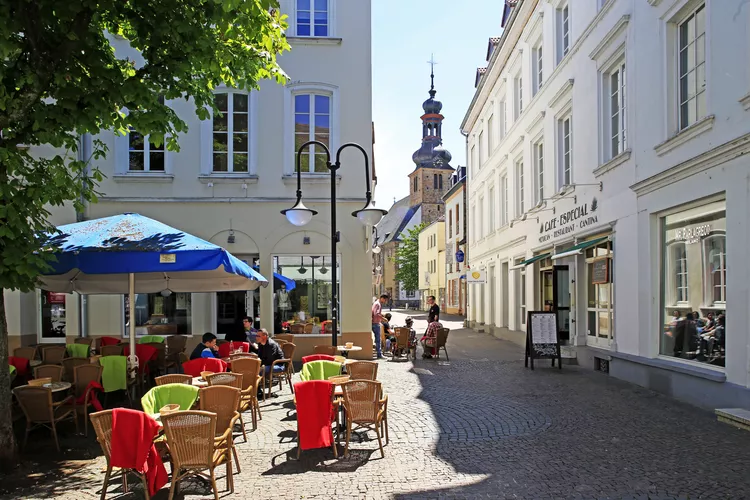It is possible to travel to Germany without even knowing how to say “prost!”, but learning some basic German helps you navigate the country and better understand the culture.
Take a look at these simple German phrases that are helpful when dining out in German restaurants. From asking for the menu to ordering to getting the check – here are useful German phrases for dining out during your visit to Germany.
Etiquette Rules When Dining Out in Germany
You’ll find that most Germans begin the meal with a hearty Guten Appetit! Similar to Bon Appetit, it is an elegant way to say “Let’s eat!”. More informally, especially at lunch, you can expect an exclamation of “Mahlzeit!“. This may be announced to the entire room when walking into a kneipe (small bar/pub) for a meal.
It is important to note that you will need to request the check at the end of the meal, as it is not common for the waiter to deliver it without asking. This allows you ample time to consider adding dessert or coffee to your order, which partly explains the slower and more relaxed customer service in Germany compared to North America.
Tipping is also handled differently here than in places like the USA. Typically, tips should only be around 10 percent and are given when settling the bill, rather than being left on the table. Depending on different dining scenarios, it is advisable to adjust your tipping accordingly.
English-German Dining Phrasebook
Here are some useful phrases to help you get straight to the food, whether it be eisbein or schweinshaxe.
(You’ll find the pronunciation in parentheses. Just read it out loud, the capitalized part of the word should be emphasized.)
- The menu, please! – Die Speisekarte, bitte! (dee SHPY-se-Cart-uh, BITT-uh)
- Waiter/Waitress – der Kellner (dehr kel-ner)
- Restaurant – restaurant (reh-stoh-RAH)
- Food – Essen (EH-sehn) This also serves as the verb “to eat”.
- Guest – Gast (gahst)
- Order – bestellen (beh-SHTEHL-ehn)
- What would you like to eat? – Was möchten Sie essen? (Vas mook-ten zee Ess-en)
- I’d like… – Ich hätte gern… (ish HAT-uh garn…)
- Without or with – ohne (O-nuh) or mit (mitt) like when ordering currywurst
- Breakfast – Frühstück (FRUU-shtuuk). Often consists of pastry or roll, meat, cheese, fruit, and coffee. However, options are expanding with pancakes, bacon, and other American specialties becoming popular.
- Lunch – Mittagessen (mit-TAHK-ess-en). The largest warm meal of the day.
- Dinner – Abendessen (AH-bent-ess-en), or the traditional meal of Abendbrot (AH-bent-broht). Often a simple affair of bread, meats, and cheese. Hence the name of Abendbrot, or “evening bread”.
- Appetizer – Vorspeise (FOHR-shpiy-zeh)
- Main Course – Hauptgericht (HOWPT-geh-reeht)
- Dessert – Nachspeise (NAHKH-shpiy-zeh)
- Vegetarian – Vegetarier / Vegetarierin (VEG-uh-TAR-ear / VEG-uh-TAR-ear-in). To order, you can say “Haben Sie vegetarische Gerichte?” (Do you have vegetarian dishes?).
- Do you have…? – Haben Sie…? (HAB-uhn see…)
- What do you recommend? – Was empfehlen Sie? (Vus emp-VAY-luhn see?)
- Is this table free? – Ist der Tisch frei? (Ist dare tish fry?). It is quite common to share tables, especially at casual establishments and beer gardens.
- Can I please reserve a table? – Kann ich einen Tisch reservieren, bitte?
- Plate – Teller (TELL-er)
- Fork – Gabel (Gob-al)
- Knife – Messer (MESS-er)
- Spoon – Löffel (Luh-fill)
- Napkin – Serviette (Serve-iet)
- Glass – Glas (Glass)
- Beer – Bier (be-ear)
- Another, please – Noch eins, bitte (Nach eins, BITT-uh)
- Ice cubes – Eiswürfel (Ice-werf-al). Good luck getting them! Ice is not commonly served or even available. Be mindful that the German word for ice cream, “eis“, sounds deceptively similar.
- Enjoy your meal! – Guten Appetit! (gootn Appetit!)
- Cheers – Prost (PRO-st)
- Thank you – Danke (DAHN-kuh)
- I didn’t order that! – Das habe ich nicht bestellt! (Dus HU-buh ish nisht buh-STELT)
- Did you like the food? – Hat es Ihnen geschmeckt? (hât éş ee-nen ge-shmêkt). Hopefully, you can respond with a cheerful “Lecker!” (delicious).
- The check, please! – Die Rechnung, bitte (dee RECH-nung, BITT-uh)
- Keep the change – Das Stimmt (Das Schtemt)
- Tip – Trinkgeld or “drinking money” (tRINK-geld)
- To take away, please. – Zum mitnehmen, bitte. It is uncommon to bring home leftovers, but you can often order a meal to take away.




